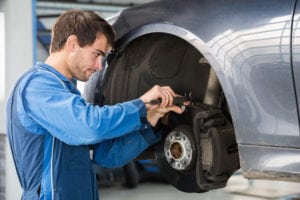
Having good brakes is one of the most important parts of being a responsible car owner. The most common type of car accident in the United States is the rear-end collision, many of which might be able to be prevented if everyone had some stronger brakes. Having newer brake pads means your car can stop faster and sooner, potentially saving you from a dangerous accident. Brake pads are heavy metal disks that press against your wheels and use friction to slow or stop the vehicle. On average brake pads should be replaced every 50,000 miles. However, keeping track of the miles since your last brake change is not always the best way to determine if you need your brakes changed. Here are the 5 signs it’s time to do something about those brakes:
- Check yourself for worn out pads. Many vehicles on the market make it easy to check your brake pads just by looking into the wheel. To do this, look through the spokes in the hub of your wheel and look for a shiny metal piece. This is called the rotor and it the part of the wheel that the brake pads press against. Follow the edge of the rotor until you see your brake pads. They will look like a vice gripping the rotor. Generally your brake pads should be at least ¼ inch thick. If they aren’t, it’s a good time to head to the mechanic.
- Listen for strange sounds. Have you ever heard a car squealing as it comes to a stop? Well, that squeal is actually trying to tell the driver that their brakes need to be changed. Brake pads are equipped with something called a wear indicator. Essentially it is a sharp piece of metal that will make contact with the rotor once the brake pads get dangerously thin. When it does, it makes this squealing sound. If your car is making this noise you need to go get new brake pads as soon as possible.
- Does your car seem to want to turn without you touching the wheel? If so you might have a problem with one of your calipers. The caliper is the clamping mechanism that presses the brake pads against the rotor. Sometimes a caliper can get partially stuck making the wheels spin at different rates and as such seem to make the car turn.
- Is your car vibrating when you stop? If so this is a sign that your rotors may be warped and bumpy. When the brake pads push against the rotor the vibrations created can shake the whole car. This problem is most common for people who do a lot of mountain driving. Mountain driving requires more intense braking which generates a lot of heat and as such can warp the metal rotors. The vibration problems can quickly lead to other problems in your car so make sure to get it checked out.
- Mushy brake pedal. If you need to press your brake pedal nearly to the floor to get your car to stop, you may have a problem with the hydraulic systems in your brakes. The braking system uses hydraulic clamps to apply pressure. If you have a mushy brake it may mean you have a leak in your hydraulic line. This is a problem that must be addressed immediately as a loss of pressure in your hydraulic line will render the brakes useless.
Keeping your brakes strong is one of the best preventative measures you can take to stay safe on the road. If you do happen to find yourself in a car accident, it is always best to seek professional help. At Franklin D. Azar & Associates your consultation is always free. Call today and we will fight to get you the compensation you deserve.


